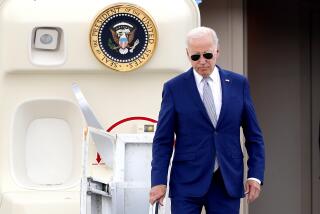India, China at Business Forum’s Forefront
- Share via
DAVOS, Switzerland — The economic race between India and China dominated this year’s meeting of the world’s business and political leaders who clearly see a shift to an Asian century.
Two years ago, the annual gabfest focused on four challengers to U.S. economic power: China, India, Russia and Brazil. China took center stage last year, but this year the spotlight was on India and China, the world’s most-populous countries. They have booming economies and huge domestic markets that are attracting major foreign investment.
James Wolfensohn, former president of the World Bank, said at Sunday’s wrap-up session of the annual World Economic Forum that “the global shift” to India and China “is hugely important.”
“We’re moving from 6 billion to 9 billion people in the next 50 years,” and all but 200 million are going to be added to the developing world, “hence the focus on India and China,” he said.
“We are also looking economically at an $8-trillion economy in the developing world growing seven to eight times in the next 50 years and the rich world 2 1/2 times. These are dramatic shifts,” Wolfensohn said.
Martin Sorrell, group chief executive of the British-based communications company WPP and a co-chair of the annual meeting, called for a creative approach to different regions, especially Asia. “That came sharply through in the cases of India and China.”
He said India’s strong presentation to leaders during the forum and reports on the strength of the Chinese economy, putting it in third place globally by some measures, had sharpened the discussions.
“But it’s not just India and China. In the context of Asia it’s countries such as Pakistan, countries such as Indonesia, Vietnam, Bangladesh in the long term, that will become critically important,” Sorrell said.
Laura Tyson, dean of the London Business School, said when she asks Americans what they think about China, all she gets is “fear.”
China’s economy will grow between 8.8% and 9.3% this year, Zhu Min, executive assistant president of the state-owned Bank of China, said during the forum.
But Cheng Siwei, vice chairman of the standing committee of the National People’s Congress, said that in China’s new five-year plan to be approved in March, Beijing was aiming for about 8% annual growth to allow for greater investment in improving life for the country’s 1.3 billion people.
India, whose economy is now growing at about 7% annually, brought top policymakers and dozens of business executives to tout its investment opportunities.
Finance Minister P. Chidambaram said the government was aiming for annual growth of 8% to 10%.
India and China have long been uneasy neighbors, with relations riddled with problems over lingering boundary disputes, competition over overseas oil and gas reserves, and India’s wariness about China’s growing military might. They fought a brief border war in 1962 and have deep differences over Beijing’s proximity to Pakistan. China is a longtime ally and weapons supplier to Islamabad, India’s bitter rival.
But their fast-growing economies and expanding search for markets have drawn China and India closer.
When asked about relations with India, Cheng stressed China’s focus on peaceful development and regional cooperation in Asia.
“We don’t want to take the lead,” he said. “We just want to be a partner.”
Chidambaram, when asked about overtaking China, said his country, with a population of about 1 billion, doesn’t want to overtake China in population.
“India and China are not in a race against each other,” he said. “We believe that the world has enough room to accommodate both India’s needs and China’s needs, both for capital, for markets, etc.
“We are on an autonomous growth path. China is following a different model. Not only are our economic models different, our political systems are different,” the minister said, touting India as the world’s largest democracy.
“We believe China has comparative advantages in some areas, India has comparative advantages in some areas. We don’t envy China. We want to emulate China. I’m confident we can do that,” Chidambaram said. “We believe the world is large enough to accommodate the aspirations of both China and India.”
More to Read
Sign up for Essential California
The most important California stories and recommendations in your inbox every morning.
You may occasionally receive promotional content from the Los Angeles Times.










